|
As long-term readers of our humble site will probably be aware, I spent a sizeable chunk of my early teens age-lying my way into just about every martial arts movie that played at local cinemas. I grew up on what is sometimes referred to as the genre's first wave, films like King Boxer, The One-Armed Swordsman, Fist of Fury, and Hapkido, and one thing these films all had in common is that they treated their storylines and characters seriously. Humour just wasn't part of the formula back then.
By the time the second wave of genre films reached western shores, I'd escaped my teenage years and was spending almost every weekend up in London at cinemas like The Scala, working my way through a back-catalogue of celebrated world cinema titles that I'd read about but never got around to seeing. As far as I was aware, the martial arts movie craze had come and gone – Bruce Lee had died at a tragically young age, and despite the industry's best efforts, no suitably enigmatic replacement had been found. Little did I know that Hong Kong action cinema already had a new star, one whose extraordinary physicality and lightning-fast skills were equalled by his talent as a physical comedian.
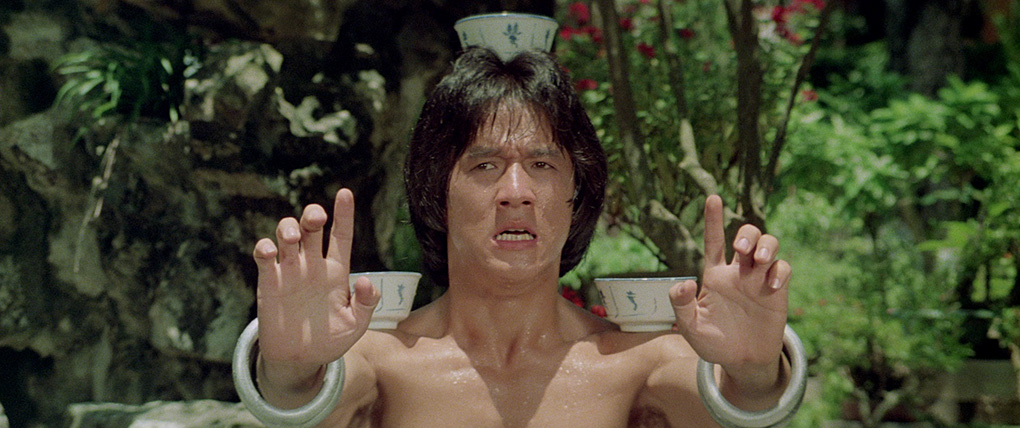
My first exposure to Jackie Chan was, as it doubtless was for (too) many in the west, his 1980 English-language debut, The Big Brawl. Chan was likeable and athletic and fought like a whirlwind, but the film itself failed to properly showcase his unique skills and was not deemed a success on any level. What I did not realise back then was that Chan was not some hot new discovery, but had been making and even starring in martial arts movies for several years. Most were undistinguished old-school kung-fu actioners, a run of which had been directed by Lo Wei, the man behind The Big Boss and Fist of Fury, the films that launched the career of a certain Bruce Lee. Then in 1978, producer Ng See-yuen promoted top fight choreographer Yuen Woo-ping to the director's chair and cast Chan in the lead role in Se ying diu sau, or as it became known in the west, Snake in the Eagle's Shadow. Where Wei had been dismissive of Chan's comedic talent, Yuen and Ng embraced it, and it's here that everything changed for Chan and for martial arts movies. The film was a huge hit, almost single-handedly revitalising and redefining the genre and simultaneously launching Chan on the road to international superstardom. A similarly toned follow-up film soon appeared in the shape of Drunken Master [Zui quan], also starring Chan and directed by Yuen Woo-ping. And as anyone who has seen it will be well aware, it's an absolute blast.
If you've somehow never watched a Jackie Chan film then seriously, where have you been? If you've only seen him in his American-made movies, then you've been seriously short-changed. A hugely talented martial artist and acrobat, it's when Chan combines both of these skills that he really comes into his own, particularly through his knack for incorporating everyday objects into the mix to upturn or strike an opponent, protect himself from blows or even help to deliver a spectacular pratfall. In his younger days (he's 63 now and still making action movies) he would risk life and limb for a breathtaking stunt and sometimes pay the price, and the sheer inventiveness and sometimes dazzling choreography of his best fights still drops my jaw on every viewing.
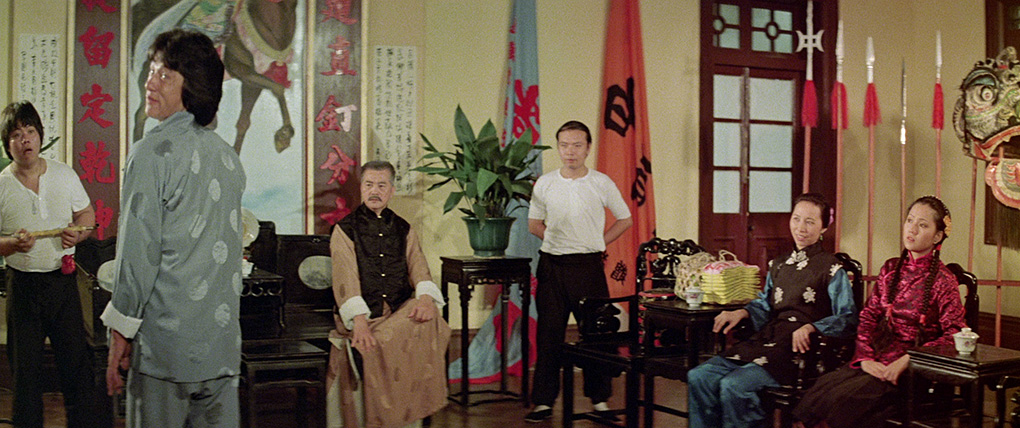
Having taken a risk on the idea of infusing action with comedy in Snake in the Eagle's Shadow and reaped the rewards, Chan and Yuen Woo-ping were free to run with the concept in Drunken Master. Here Chan plays Wong Fei-hung, a legendary Chinese martial artist, physician and folk hero who has been played by various actors in a good many martial arts movies, most famously by Donnie Yen in the Once Upon a Time in China series. But where others have portrayed Wong as the honourable and decent man we like to believe he was, Chan plays him as a mischievous youth, a walking trouble magnet who in the film's first twenty minutes humiliates his teacher, tricks an attractive girl (Tong Jing) into jumping into his arms, then gets into and loses a fight with her mother (Linda Lin), who turns out to be a visiting aunt to whom he then makes a comically ludicrous pantomime of trying not to show his face in the pathetic hope that she might not recognise him. His only righteous act is to give a local bully and a well-deserved pasting, but even this blows up in his face when the man's influential father and an entourage of loyal brutes roll up at the Wong home demanding vengeance.
Fed up with his son's rambunctious behaviour, his father Wong Kei-ying (Lam Kau) enlists the help of his brother – a man known widely as Beggar So (Yuen Siu-tien) – to slap the boy into shape. Beggar So is a man with a fearsome reputation as a martial arts instructor who shows his students no mercy, something Wong learns to his cost when the two meet by chance, the result of yet more tomfoolery on the mischievous Wong's part. From Wong's point of view, the arduous training programme that So subjects him to appears to be heading nowhere, but this all changes when his new teacher reveals the secrets of a singular fighting style known as The Eight Drunken Gods, one that is only truly effective when its practitioner has swallowed vast quantities of alcohol. Wong thus continues his training, but hovering in the background is deadly assassin-for-hire Yim Tit-sam (played by northern style kickboxing master Hwang Jang Lee), who beats and humiliates Wong and is later tasked with killing his father.
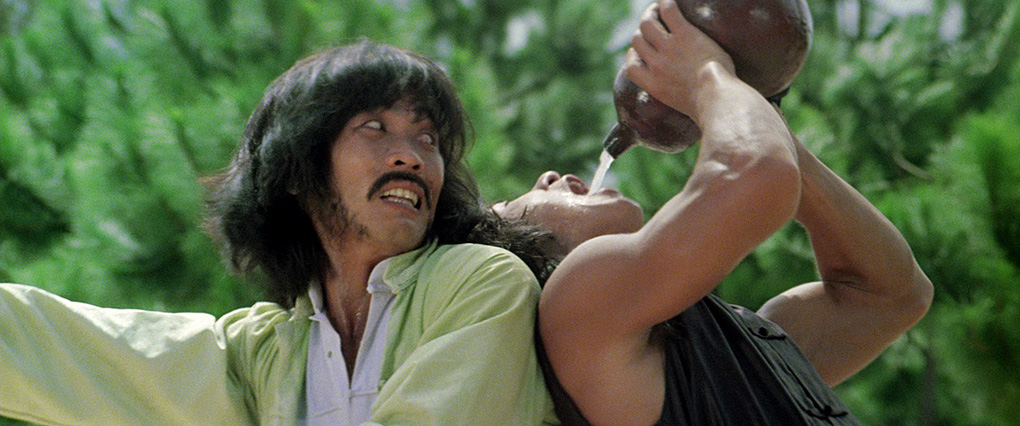
There's something wonderfully irresponsible about a film built around the concept of achieving excellence through the wanton consumption of alcohol, an aspect of the project that Chan later regretted and toned down in the belated but seriously impressive sequel. Here, wine does for So – and eventually Wong – what spinach does for Popeye, but without the cartoon sailor's pesky healthy-eating subtext. Indeed, the one time that So sobers up and doesn't have a flask of wine to hand, he only avoids losing a fight by making a hasty exit. If it weren't for the insanely punishing training and physical speed and strength required, I have little doubt that this would be the martial art for me.
I know I've said this before (and the very same point is made more than once on extras on this disc), but structurally speaking, martial-arts movies are close cousins of musicals, films whose plots are secondary to the set-pieces that are their true raison d'être (that the same is structurally true of porn movies and sex scenes is something I'd best let slide). In musicals, it's all about the songs or dance numbers, and in kung-fu movies it's all about the fights. In this respect, Drunken Master more than meets its quota, and like the song and dance numbers in the very best Hollywood musicals, every single fight scene here is a joy to behold. Thanks to the likes of The Matrix and Kill Bill, even mainstream western audiences have become aware of the work of master action choreographer Yuen Woo-ping, but he's at his best when teamed with a performer of Chan's skill, dexterity and athleticism, and they have crammed the film with showpiece action scenes, between which are sandwiched amusing training sequences and small pauses for plot and character advancement and to get your breath back. What was quickly to become Chan's signature style is in full evidence here, as he spins, weaves and somersaults around and over opponents and he and Yuen Siu-tien inventively turn everything from chairs and clothing to vegetables and dishcloths and even each other into tools for attack, defence and deflection. There's a very slightly staccato feel to the fighting styles here, with moves separated by the briefest of micro-pauses rather than flowing fluidly into each other as they do in later Chan films, but so dazzling is the choreography and its execution that this matters not a jot and enhances the sense that we're watching a precisely rehearsed dance. And unlike so many western directors of martial arts battles, Yuen Woo-ping knows just how to film them, employing a combination of long-held wide shots and the genre's signature crash zooms to showcase the skills of the performers instead of losing them in a blizzard of fast-cut edits and cutaways. Of course, being an early work of the genre's second wave, every punch and slap is accompanied by an exaggerated ‘thwack' and every movement of arm or leg by an improbably loud whoosh. Personally, I wouldn't have it any other way.
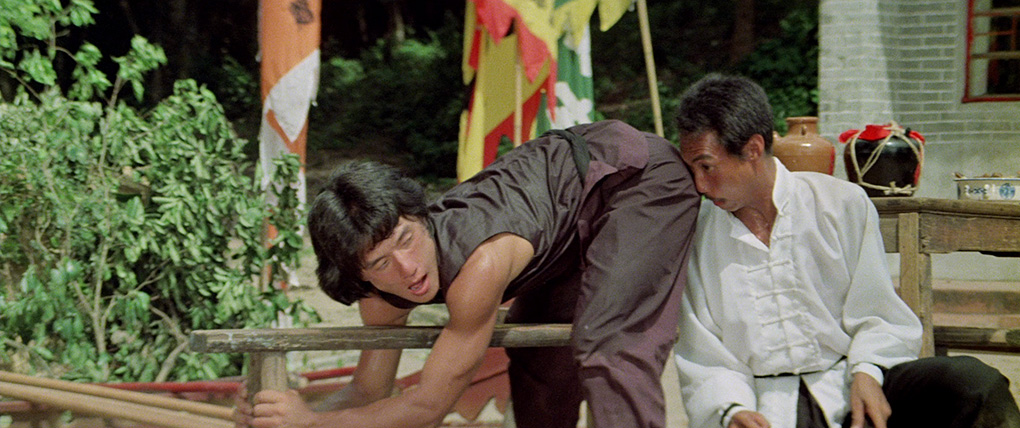
The comedy is sometimes broad to the point of outright silliness and is not above dipping its toes in the gutter. In one fight, Chan humiliates his opponent by slamming his face into a cowpat (complete with mocking Sad Trombone musical accompaniment), having just moments earlier farted directly into his face, while in another a series of hammer hits delivered to the supposedly iron head of a bald opponent give immediate rise to huge hammerhead-shaped wheals in the manner of a Looney Tunes cartoon. Yet it's nigh-on impossible to watch the comically slanted fights here without wearing the very broadest of grins, and just occasionally a gag is so sublimely executed – my favourite comes when the fearsome King of Sticks (Hsia Hsu) angrily approaches So's hut to avenge his friend's beating, and on discovering who his opponent is turns brusquely to his friend and barks, "Let's go!" – that it made me laugh out loud.
Whether Drunken Master is one of Chan's very best films is a point on which fans will endlessly disagree, but it's definitely one of his most important and most beloved. Chan would continue to develop and refine his art, creating faster and more complex fight scenes and peppering them with genuinely death-defying stunts. Yet wonderful though so many of them are, few can match the sense of fun that runs through every aspect of what remains to this day one of the most influential and joyously entertaining martial arts films of its day.
Back when I was reviewing DVDs of martial arts titles released by Hong Kong Legends, I was made aware by the commentaries that accompanied them of the considerable difficulties facing anyone looking to restore such films to pristine condition, and to see Drunken Master looking as good as it does here really warms my heart. Framed in its original 2.35:1 aspect ratio, the transfer on the Blu-ray in this dual format set is deliciously crisp in its detail, with robust colour reproduction (albeit with an earthy hue, but blue skies are radiant) and a sublimely pitched contrast range, with crisp black levels and no loss of key shadow detail, even in darker scenes. That the sharpness occasionally softens is unsurprising given the rarity of pristine source materials for films of this genre and vintage – these films were never expected by those who made them to have a life beyond their original cinema release, and good care was rarely taken of the negatives or projection prints. On the whole, it's an excellent job, and the film looks better than I've ever seen it.
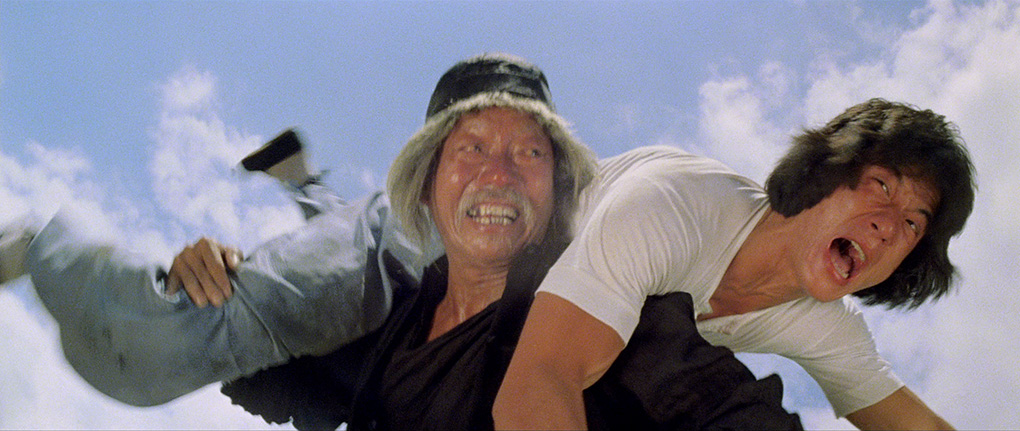
Impressively, the original Cantonese, Mandarin and English dubs have all been included here, though it is worth noting that the Mandarin track was originally produced for a shorter version of the film and the English track has thus been used to fill in the gaps. With that in mind, Cantonese is definitely the one to go for and appears to be the most accurate to the dialogue as delivered, but either of the Chinese tracks are preferable to the English dub. OK, I know this is how many of us first saw these films and its inclusion is thus fully justified, but listening to the English language track now is an intermittently wince-inducing experience, from the sometimes comical mismatch of voices to characters to the wildly varying quality and geographical diversity of the voice acting – Wong is played as gee-whizz American teen named Freddie, his aunt appears to have descended from British aristocracy, and a number of the supporting players sport blatantly fake "Me Chinese" accents. There are also, perhaps inevitably, some considerable differences in the content of the dialogue between the English and Chinese tracks, notably in the attempts to spice up threats and insults for a western audience. Thus, "Well, aren't you stubborn" on the Cantonese track becomes "You don't hang around here, you bum. Keep moving your arse" (and yes, it's "arse" not the expected American "ass"), and "Nobody talks like that to me" is beefed up to "I warn you, shit face, I pick who I'm gonna bury next." All three tracks are Linear PCM 1.0 mono and of similar quality, with the expected restrictions in range balanced out by decent dialogue clarity and the loudness of the thwacks and whooshes of combat. There is a slight background hum on the Cantonese track in places and some faint distortion on louder sounds on the Chinese language tracks that is typical of martial arts films of the period, but there is no damage evident on any of the soundtracks and they are otherwise is in solid shape.
Adding to this disc's sense of completion, Eureka has included four separate optional English subtitle tracks, one for the Cantonese audio track, one for the Mandarin, one for the deaf and hearing impaired, and – my personal favourite – a reproduction of the dual Chinese and English subtitles that accompanied the film on Hong Kong theatrical release, one that – and I quote from the menu on this disc – "has been transcribed with all its inherent spelling and grammatical errors meticulously retained." What dedication.
Commentary
Richard Myers, author of Great Martial Arts Movies: From Bruce Lee to Jackie Chan...and More, and Jeff Yang, co-author of I am Jackie Chan: My Life in Action, work well together here to deliver a packed and consistently interesting commentary on the film, its performers, its makers and the martial arts genre. As devoted fans of Chan and his work, there's plenty of praise dished out for just about everything he does here, but it's always contextualised and is backed up with factual information and well-argued opinion. Subjects under discussion include Chan himself, the supporting cast, this movie's key place in martial arts movie history, the character of Wong Fei-hung, and a good deal more. Yang neatly sums up the learning journey undertaken by the film's lead character as "developing internal maturity to reflect external skills," and Myers is convinced that some of the fight and training sequences have been trimmed since he first saw it and speculates that the footage has probably been lost. This commentary was originally recorded in 2002 for an earlier DVD release, something only really betrayed by a reference to the "recently released" Crouching Tiger, Hidden Dragon and the claim that the now 63-year-old Chan is actually 49.
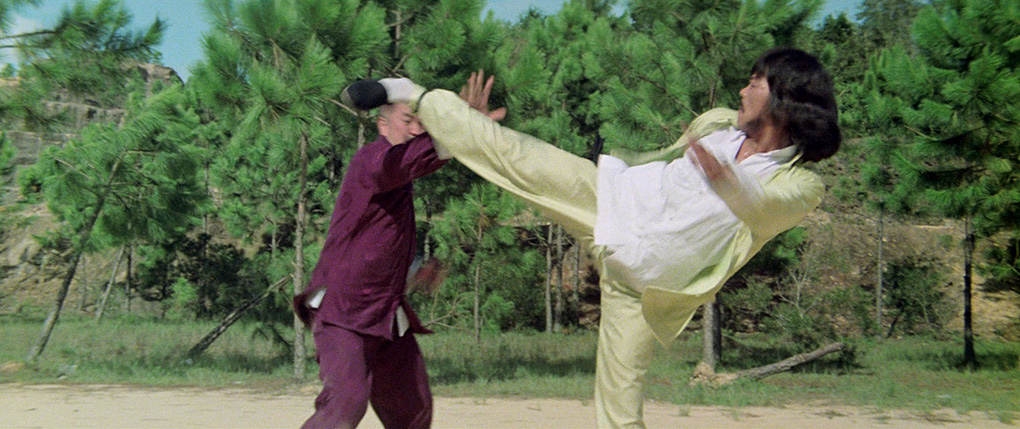
Jackie Chan (21:08)
In an interview that the captioned questions suggest was shot for Japanese distribution, Chan looks back at a film that was made so long ago he that his memory is fuzzy about some aspects of its making. He does recall that its phenomenal success went to his head at the time, prompting him to believe he was ‘king of the world' and launching him on an unrestrained spending spree that was brought to a halt when he began doing charity work. He talks about the insane number of gifts that were sent to him by Japanese fans, cannily suggests that the popularity of his films stems in part from the idea that his actions could be executed by anyone with enough practice (not something you could say about Spiderman and his ilk), and does have some regrets about making a film that could have encouraged youngsters to drink and pick fights. Intriguingly, when asked what he might have done for a living had he not been an actor or director, he claims he would have been a cleaner. "I really love cleaning," he says with a grin. The interview is conducted in Cantonese with English subtitles.
The Young Master – Gareth Evans on Drunken Master (21:24)
The hugely likeable director of The Raid films discusses his long-standing love of Jackie Chan movies and his amazement at the ability of filmmakers of that period to stage complex action sequences to camera without the benefit of instant video playback. He outlines the formula at the heart of a successful martial arts movie and the influence of Chan's work on his own first feature, Marantau, as well as Chan's knack for devising gags and sequences based on what he observes around him.
Tony Rayns on Drunken Master (41:34)
Renowned Asian cinema expert and writer Tony Rayns provides a wonderfully detailed exploration of Jackie Chan's early film career and his journey to Drunken Master, via his work for Lo Wei and the box-office success of Snake in the Eagle's Shadow. We get information on some of the fighting techniques used in the film, an analysis of what was so game-changing about it, and information on Wong Fei-hung and his cinematic representations. In a variance on the comparison with musicals made by myself and others on this disc, he equates the experience of seeing Chan acrobatically fight to watching Fred Astaire and Ginger Rogers dance, and is curtly dismissive of Enter the Dragon for its failure to film fights in a manner that best showcases the skills of the performers, even referring to Robert Clouse as "that idiot director." Steady on. He's absolutely on the nose, though, when he describes Drunken Master as "the foundation stone of Jackie Chan's career."
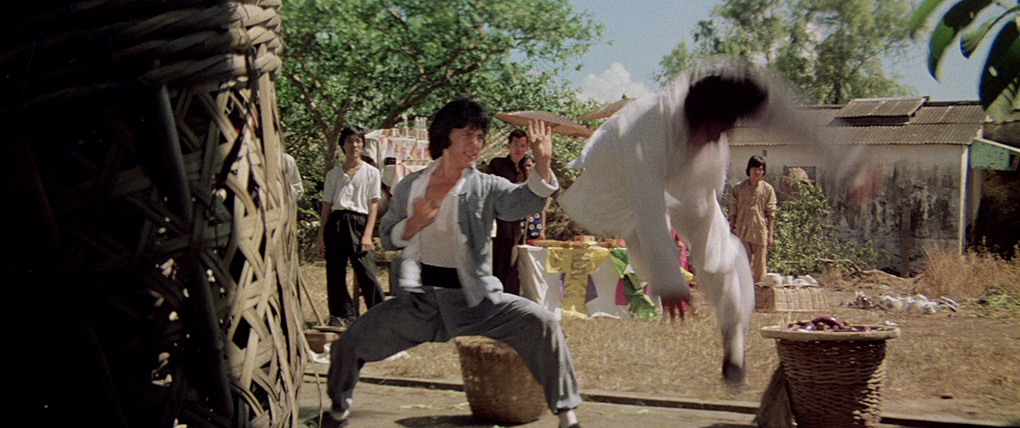
Ng See-yuen (14:05)
Shot handheld in available light on what looks like a DV palmcorder, this grabbed interview with producer Ng See-yuen is nonetheless worthwhile, though it does cover his career as a whole and some of the other future stars he worked with rather than being specifically focussed on Chan or Drunken Master. I'm not sure when this was shot, but it's at a time when neither Ng or his English-accented interviewer are optimistic about the future of Hong Kong cinema.
Deleted Scene (1:48)
A cut sequence in which Wong practices the fighting styles of the Eight Drunken Gods with a cup and wine flask, as the name of each of style is announced by So and appears as an animated Chinese language character.
Original Trailer (4:27)
An odd American trailer in which Chan is repeatedly referred to as "The Drunken Fairy," while the film is at one point mysteriously described as "soothing and hilarious." Excuse me?
UK Music Promo (1:29)
Extracts from the film cut to dramatic orchestral music. What the hell is this?
Kicking Showcase (1:34)
An extract from another unidentified film featuring Hwang Jang-lee and some impressive northern style kickboxing.
Booklet
A fine companion to the film, this 20-page booklet kicks off with an excellent essay on the film by Michael Brooke, which is followed by the names of the Eight Drunken Gods and Japanese cartoons of each, and an international poster gallery (there's some eye-catching stuff here). Credits for the film and the standard notes on viewing are also included.
More fun than any action film you're likely to see all year and then some, Drunken Master still dazzles in the ingenuity and athleticism of its combat and remains one of Chan's most consistently good natured and enjoyable films. It's an unexpected but most welcome addition of Eureka's Masters of Cinema series, and boasts the sort of transfer and high quality special features that you'd expect of such a title. Highly recommended.
|